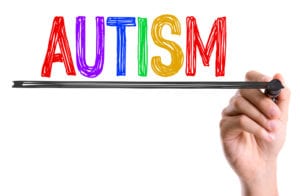Written by Joyce Smith, BS. Comparing an original open-label trial of MTT to a two-year follow-up study revealed that significant improvements in ASD symptoms of participants carried over and even improved further at the end of the two-year follow-up.
 In 2017, an open-label modified-fecal microbial transplant study was done on 18 children with ASD and moderate to severe GI problems to determine the long-term safety and potential benefits of Microbial Transfer Therapy (MTT). The children received two weeks of vancomycin treatment, a stomach acid suppressant followed by a bowel cleanse and then high dose fecal microbiota transplant (FMT) for 1-2 days and 7–8 weeks of daily maintenance doses along with a stomach-acid suppressant, administered to children with ASD and chronic gastrointestinal problems 1. After this 10-week MTT treatment and an eight-week follow-up observation period (18 weeks in total), Kang et al observed an 80% reduction in GI symptoms and a slow but steady improvement in core ASD symptoms. They also found that gut microbial diversity, including potentially beneficial microbes (Bifidobacteria and Prevotella), had increased significantly after MTT 1.
In 2017, an open-label modified-fecal microbial transplant study was done on 18 children with ASD and moderate to severe GI problems to determine the long-term safety and potential benefits of Microbial Transfer Therapy (MTT). The children received two weeks of vancomycin treatment, a stomach acid suppressant followed by a bowel cleanse and then high dose fecal microbiota transplant (FMT) for 1-2 days and 7–8 weeks of daily maintenance doses along with a stomach-acid suppressant, administered to children with ASD and chronic gastrointestinal problems 1. After this 10-week MTT treatment and an eight-week follow-up observation period (18 weeks in total), Kang et al observed an 80% reduction in GI symptoms and a slow but steady improvement in core ASD symptoms. They also found that gut microbial diversity, including potentially beneficial microbes (Bifidobacteria and Prevotella), had increased significantly after MTT 1.
Two years after completion of the original clinical trial, Kang et al 2 re-evaluated the 18 participants to determine whether their previously observed improvements in behavior and GI symptoms had persisted, and to determine the long-term impact of MTT on the gut microbiome. Most participants reported that GI symptoms remained improved compared to baseline. There was a 58% reduction in Gastrointestinal Symptom Rating Scale and a 26% reduction in percent days of abnormal stools (Daily Stool Recorder) relative to baseline. In addition, parents reported a slow but steady improvement in core ASD symptoms.
While the original FMT treatment had substantially increased microbial diversity and the presence of beneficial bacteria in the gut, two years later, diversity was even higher and the presence of beneficial microbes persisted. In fact, based on the Childhood Autism Rating Scale (CARS) rated by a professional evaluator, the severity of ASD at the two-year follow-up was 47% lower than baseline, compared to 23% lower at the end of week 10 of the original open-label trial. Also, at the beginning of the open-label trial, 83% of participants were rated as “severe” autism per the CARS; however, at the two-year follow-up, only 17% were rated as severe, 39% were in the “mild/moderate” range, and 44% of participants were below the ASD diagnostic cut-off scores.
Noteworthy, is the fact that all 18 of the study participants exhibited GI symptoms from infancy, including chronic constipation and/or chronic diarrhea. The two-year follow-up demonstrated that the treatment benefits extended beyond their physical symptoms, even causing some parents to note how much their children’s behavior had improved over time. Statistical analysis revealed that improvements in GI and ASD symptoms were significantly correlated (P<0.005), which is consistent with other studies 3-5 and may have been related to the microbial transfer therapy.
A limitation of the study is the absence of additional gastrointestinal evaluations to rule out ulcerative colitis, Crohn’s Disease, and celiac disease, which may have limited the interpretation of GI improvements. However, the study demonstrated that intensive MTT intervention is a potential therapy for ASD children with GI problems. Therefore, future randomized, placebo-controlled trials of larger cohorts are required to better evaluate the effectiveness of MTT.
Source: Kang, Dae-Wook, James B. Adams, Devon M. Coleman, Elena L. Pollard, Juan Maldonado, Sharon McDonough-Means, J. Gregory Caporaso, and Rosa Krajmalnik-Brown. “Long-term benefit of Microbiota Transfer Therapy on autism symptoms and gut microbiota.” Scientific reports 9, no. 1 (2019): 5821.
© The Author(s) 2019. This article is licensed under a Creative Commons Attribution 4.0 International License, http://creativecommons.org/licenses/by/4.0/.
Click here to read the full text study.
Posted May 6, 2019.
Joyce Smith, BS, is a degreed laboratory technologist. She received her bachelor of arts with a major in Chemistry and a minor in Biology from the University of Saskatchewan and her internship through the University of Saskatchewan College of Medicine and the Royal University Hospital in Saskatoon, Saskatchewan. She currently resides in Bloomingdale, IL.
References:
- Kang DW, Adams JB, Gregory AC, et al. Microbiota Transfer Therapy alters gut ecosystem and improves gastrointestinal and autism symptoms: an open-label study. Microbiome. 2017;5(1):10.
- Kang DW, Adams JB, Coleman DM, et al. Long-term benefit of Microbiota Transfer Therapy on autism symptoms and gut microbiota. Sci Rep. 2019;9(1):5821.
- Ilhan, Z. E. et al. Distinctive microbiomes and metabolites linked with weight loss after gastric bypass, but not gastric banding. Ismejournal 11, 2047–2058, https://doi.org/10.1038/ismej.2017.71 (2017).
- Ahn, J. et al. Human gut microbiome and risk for colorectal cancer. Jnci-Journal of the National Cancer Institute 105, 1907–1911, https://doi.org/10.1093/jnci/djt300 (2013).
- Ott, S. J. et al. Reduction in diversity of the colonic mucosa associated bacterial microflora in patients with active inflammatory bowel disease. Gut 53, 685–693, https://doi.org/10.1136/gut.2003.025403 (2004).
